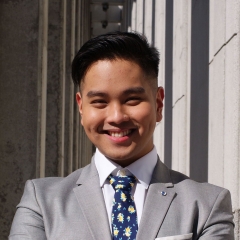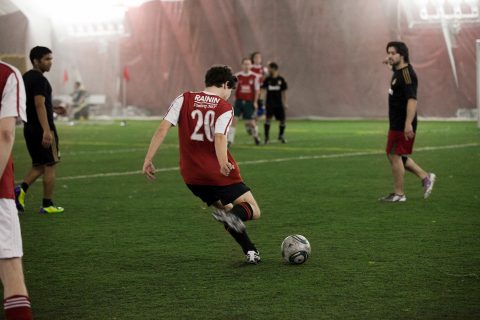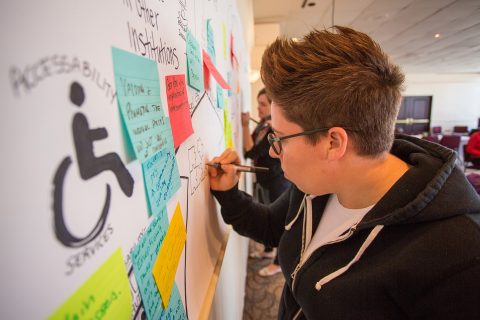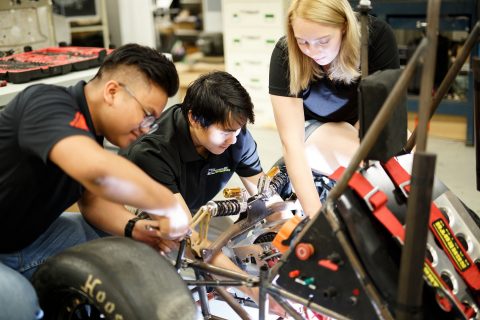Human Relations (BA)
Why study Human Relations?
Train the leaders of the future. Help people fulfill their potential. When you study human relations, your passion for people shapes you into an agent for social change. Expertise in human relationships in the community and the workplace sets you on a path towards the helping professions. Whether you want to build strong teams in the corporate world or get organized at a grassroots level, our Human Relations program gives you the tools to become a next-generation leader.
Newly admitted students will enter the department in the Human Relations Major or Specialization program. The student will be able to select a concentration at the end of their first semester after having successfully completed the course AHSC 270 (Introduction to Human Relations Theory and Research). AHSC 270 will give a broad perspective on the various systems upon which the Human Relations concentrations will focus. Transfers to one of the concentrations will be done by way of an internal transfer process available in the department.
Our department offers four concentrations in which to focus:
Good facilitation can power a change in how people think and act in their personal and professional lives, as well as support larger positive social change. The Individual and Small Group Processes concentration focuses on working with individuals, small groups, and teams, grounded in an understanding of individual and group developmental tasks, issues, and process. It allows you to acquire a fundamental set of skills, knowledge, and behaviours, as outlined by the International Association of Facilitators (IAF), that support effective facilitation in a wide variety of contexts.
Community Development is a discipline that involves identifying and building on the strengths and needs of communities. This concentration will provide students with both the practical and analytical skills needed to work with communities to engage and enact change by developing their capacity to identify concerns and solutions. Students will learn how to create opportunities for communities to act together, to make changes that foster social inclusion and equality. Our program will prepare students to work with a defined geographical area (cities, suburbs or rural areas), and/or with specific groups of people (e.g. persons with disabilities, youth, children, families, newcomers, the unemployed, and the homeless).
The world is changing fast, and so are the places—the public, private and nonprofit sector organizations—where people work. Our ODC concentration prepares you to influence the evolution of 21st century workplaces. ODC is the planned effort to enhance an organization’s effectiveness through an approach, both relational and analytic, to understand the challenges and opportunities facing an organization and then to design and implement interventions to bring about change. Drawing on decades of behavioural science research and expert practice, you will learn how to help organizations to understand and solve the tough problems that they are facing.
Most of us grew up in families, so we have a pretty good idea about how families work. But not all families work well and not all families work well all the time. Family Science is a discipline that emphasizes the scientific study of families. Family Science attracts practitioners, educators, and researchers who focus on different aspects of family life at different stages of family development—with the overall goal of strengthening and empowering families.
Program highlights
- Unique program for acquiring leadership and team-building skills
- Flexible and customizable program options
Special funding for out-of-province students
Up to $4000 for undergraduate programs.
Program structure
A Bachelor of Arts degree takes a minimum of three or four years (90 – 120 credits) of full-time study, depending on your academic background.
Program options
- Specialization in Human Relations (60 credits)
The concentrations in Individual & Small Group Processes; Family Science; Community Development; and, Organization Development and Change have specialization options. The Specialization is intended to develop a high level of skill and knowledge in the specific concentration and its applications in practical settings.
The Specialization includes a research component and an internship in the final year, culminating and focusing on the student's emphasis of study.
- Major in Human Relations (42 credits)
The concentrations in Individual & Small Group Processes; Community Development; and, Organization Development and Change have major options.
The Major is intended to develop human relations skills and a good grounding in the specific concentration. The Major includes a fieldwork component in the final year, which gives the students an opportunity to apply the skills, and knowledge derived from the classroom. The Major gives the students the flexibility to take a variety of elective courses in other areas in addition to Applied Human Sciences, or for those with specific needs or interests, to select a double Major or Minor in another department to fulfill their degree requirements.
- Minor in Human Relations (30 credits)
This program gives the student an opportunity to obtain knowledge and practice in group dynamics, group leadership, interpersonal relations and communications, design skills and simulated class practice in facilitation. The Minor is designed to provide a basic understanding of group and/or teamwork which is an increasingly important aspect in today's work environment.
Courses
United States students: A U.S. Federal Student Aid-eligible version of this program is offered. This version meets all U.S. regulations (such as no co-operative education or e-courses) for eligible programs.
Admission criteria
Minimum cut-off averages and course requirements
- Quebec CEGEP: 22
- High School: B-
- ACT or SAT is NOT required
- Canadian curricula course requirements
- Accepted international qualifications
- International Baccalaureate (IB) diploma: 27
- International Baccalaureate Career-related Programme (CP): 4.5/7
- Baccalauréat français: 12
- British system of education (GCE):
- A-levels: At least two A-level exams CD or
- AS-levels: At least 4 AS-level exams with equivalent results or
- BTEC: Level 3 Diploma or Extended Diploma in a related subject area with equivalent results
- Additional information for British System of Education (GCE) applicants
- University Transfers (internal/external): B-
Minimum cut-off averages should be used as indicators. The cut-off data may change depending on the applicant pool. Applicants who meet the stated minimum requirements are not guaranteed admission to these programs.
Application deadlines

FALL ENTRY (September)
Deadline: March 1
U.S. and international applicants: Apply no later than February 1 to allow time for immigration document processing. However, applying earlier is strongly recommended. Immigration processing times vary by country and delays could prevent you from starting your studies on time.

WINTER ENTRY (January)
Deadline: November 1
U.S. and international applicants: Apply no later than August 1 to allow time for immigration document processing. However, applying earlier is strongly recommended. Immigration processing times vary by country and delays could prevent you from starting your studies on time.
We reserve the right to close admission to a program at any time after the official deadline without prior notice.
After your degree
Human Relations alumni have sound knowledge in group dynamics and process, change management, interpersonal communications and how people learn. These are all transferable skills that are useful in a variety of areas that include:
- Social service agencies
- Youth service organizations
- Corporations
- Government administration or management
Student story

Rudyard Pejo
Major Human Relations
Minor in Psychology
Having a community is very important, especially when you first start university.

Cindy Balan
Major in Human Relations
The Human Relations program allowed me to understand the application of theories pertaining to psychology, sociology, anthropology, and more.
Other programs of interest

When you study leisure sciences, you learn administrative and programming skills that help you develop leisure programs for all ages.
Department
Department of Applied Human Sciences
Faculty

When you study therapeutic recreation, your passion for people shapes you into an agent for change. As a therapeutic recreation specialist, you assess individual leisure needs in order to design specialized programs for individuals with physical, social, intellectual, or emotional disabilities.
Department
Department of Applied Human Sciences
Faculty

Build engines. Design robots. Control explosions. As a mechanical engineer, you will create, construct and control machines. Whether it’s a vehicle, an aircraft engine or an assembly line, mechanical engineers know how to fit that square peg into a round hole, and do it with a little finesse.
Department
Department of Mechanical, Industrial and Aerospace Engineering
Faculty

